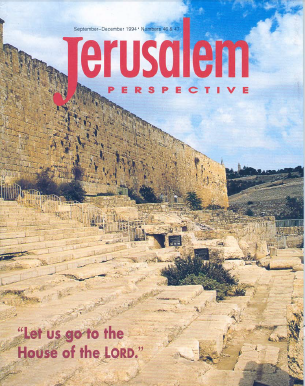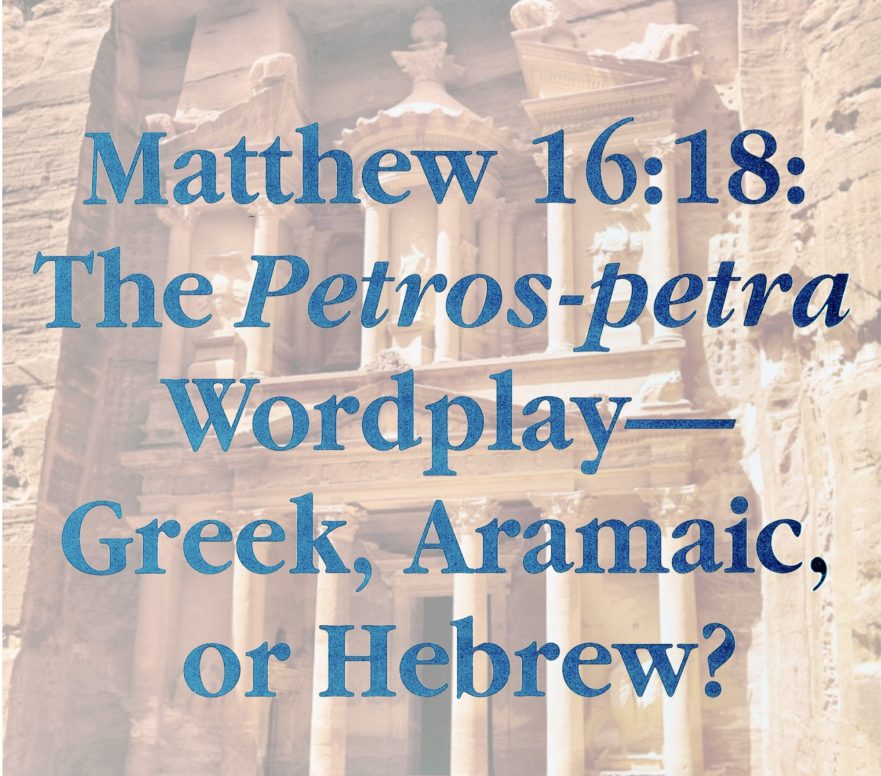How to cite this article: David N. Bivin, “Matthew 16:18: The Petros-petra Wordplay—Greek, Aramaic, or Hebrew?” Jerusalem Perspective 46/47 (1994): 32-36, 38 [https://www.jerusalemperspective.com/2718/].

The recognition that the synoptic gospels are derived from a Semitic source or sources seems essential to any productive methodology of interpretation. Often, unless one translates the Greek texts of the synoptic gospels to Hebrew, one cannot fully understand their meaning. For example, when the Beatitudes are translated to Hebrew, one sees that they are not eschatological, but, like the beatitudes of the Hebrew Scriptures,[1] speak of rewards in the here and now.
Greek Wordplay?
The Greek words πέτρος (petros) and πέτρα (petra) employed by Jesus in Matthew 16:18 make a nice wordplay.[2] This Greek wordplay appears to be a direct contradiction to the assumption that Jesus taught in Hebrew. If Jesus delivered this saying in Hebrew, as many scholars in Israel assume, how could it have contained a Greek wordplay?
Some scholars have suggested an Aramaic background to Jesus’ saying. Joseph A. Fitzmyer, Professor Emeritus of The Catholic University of America in Washington, D.C., and one of the world’s most distinguished New Testament scholars, suggests that Jesus employed an Aramaic wordplay (Kepha-kepha) in his response to Peter’s declaration.[3] However, Fitzmyer acknowledges a difficulty: he wonders why the Matthean Jesus did not say, “On this petros I will build….”[4] This difficulty is a product of Fitzmyer’s Aramaic reconstruction. He has been forced in Aramaic to reconstruct Jesus’ wordplay using only one word;[5] therefore, he is unable to preserve the wordplay reflected in Greek, a play on two different words.
Paid Content
Premium Members and Friends of JP must be logged in to access this content: Login
If you do not have a paid subscription, please consider registering as a Premium Member starting at $10/month (paid monthly) or only $5/month (paid annually): Register
One Time Purchase Rather Than Membership
Rather than purchasing a membership subscription, you may purchase access to this single page for $1.99 USD. To purchase access we strongly encourage users to first register for a free account with JP (Register), which will make the process of accessing your purchase much simpler. Once you have registered you may login and purchase access to this page at this link:

- [1] For example, Ps. 1:1-3. ↩
- [2] See my, “Hebraisms in the New Testament,” Encyclopedia of Hebrew Language and Linguistics (4 vols.; ed. Geoffrey Khan; Leiden: Brill, 2013), 198-201, and the JP version, “Hebraisms in the New Testament.” ↩
- [3] Joseph A. Fitzmyer, “Aramaic Kepha’ and Peter’s name in the New Testament,”Text and Interpretation: Studies in the New Testament presented to Matthew Black, ed. Ernest Best and R. McL. Wilson (Cambridge, UK: Cambridge University Press, 1979), pp. 121-132. Fitzmyer suggests that in Aramaic Jesus said: antah hu Kepha we’al kepha den ebneh… (You are Kepha[Cephas], and on this kepha [rock] I will build…). ↩
- [4] Substituting the Greek masculine petros for the Greek feminine petra, the reading of all Greek manuscripts. See Fitzmyer, ibid., pp. 130-131: “The problem that confronts one is to explain why there is in the Matthean passage a translation of the Aramaic substratum, which is claimed to have the same word kepha twice, by two Greek words, πέτρος and πέτρα… If the underlying Aramaic of Matt. xvi.18 had kepha twice, then we should expect σὺ εἶ Πέτρος, καὶ ἐπὶ τούτῳ τῷ πέτρῳ οἰκοδομήσω….” Cf. Fitzmyer’s recent comments in response to a magazine reader’s letter (“Queries & Comments,” Biblical Archaeology Review 19.3 [1993], 70). For Fitzmyer’s Aramaic reconstruction to be correct, the Greek text should read, “on this petros I will build….” ↩
- [5] The word כֵּפָא (kepha). The only difference between Kepha and kepha in Fitzmyer’s reconstruction is the capitalization of the former. This distinction, however, does not exist in Aramaic, since in Aramaic there are no capital letters. ↩































































































